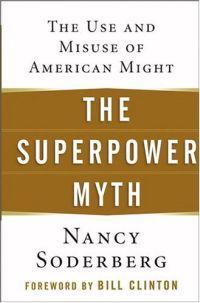

Purchase
The Use and Misuse of American Might
John Wiley & Sons
February 2005
416 pages
ISBN: 0471656836
Hardcover
Add to Wish List
Non-Fiction
Are there limits to American power? The neoconservative
brain trust behind the Bush administration don't seem to
recognize any. After the cold war, many Americans--on both
sides of the aisle--have come to mistakenly believe that the
United States has become powerful enough to do whatever it
wants, wherever it wants, without regard to allies, costs,
or results. But as events in Iraq are proving, America may
be incredibly powerful, but it is not all powerful. Drawing on her eight years as a high-ranking official
in the Clinton administration, Nancy Soderberg takes you
behind the scenes in the highest echelons of government to
examine how the president and his advisors responded to the
challenge of shaping a new foreign policy for the post-cold
war era. She cites personal recollections, recently
declassified documents, and interviews with the principals
involved in these decisions to provide insight into the
decision-making process that all presidents face--often in
crisis situations without complete information and with
lives hanging in the balance. Soderberg carefully
contrasts Clinton's approach--as it evolved from a shaky
start in Somalia and Haiti, through peacemaking efforts in
Ireland and the Middle East, to a carefully crafted blend of
diplomacy, force, leadership, and cooperation in Bosnia and
Kosovo--with Bush's embrace of the superpower myth, which
holds that America is powerful enough to bend the world to
its will, largely through unilateral force, whether that
goal is spreading democracy, ending terrorism, avoiding
nuclear war, maintaining homeland security, or creating
peace. The only uncertainty the Bush administration feels it
faces is when and where to act. As The Superpower
Myth makes startlingly clear, no country, in practice, could
ever be strong enough to solve problems like Somalia,
Kosovo, and Afghanistan through purely military means. In
the future, America's power will constantly be called upon
to help failed and failing states, and it is becoming clear
that the complex mess of Somalia (and now Iraq) has replaced
the proxy war of Vietnam as the model for what future
military conflicts will look like: a failed state, a power
vacuum, armed factions, and enough chaos to threaten an
entire region. Using vivid examples from her years in the
White House and at the United Nations, Nancy Soderberg
demonstrates why military force alone is not always
effective, why allies and consensus-building are crucial,
and how the current administration's faulty worldview has
adversely affected policies toward Israel, Iraq, North
Korea, Haiti, Africa, and al Qaeda. Powerful,
provocative, and persuasive, this timely book demonstrates
that the future of America's security depends on overcoming
the superpower myth.
Comments
No comments posted.
Registered users may leave comments.
Log in or register now!
| 


 © 2003-2025 off-the-edge.net
all rights reserved Privacy Policy
© 2003-2025 off-the-edge.net
all rights reserved Privacy Policy